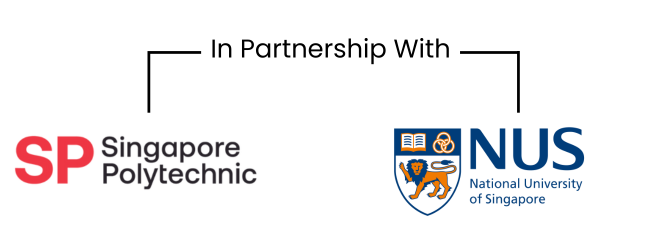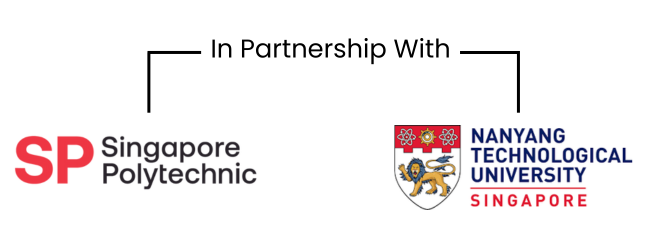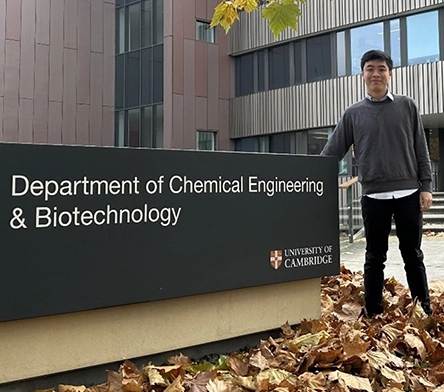If you enjoy solving complex problems in physics, maths, chemistry, and technology, the Diploma in Chemical Engineering (DCHE) is your path. As Singapore’s FIRST and ONLY internationally accredited chemical engineering diploma, DCHE gives you a head start by allowing you to take NUS and NTU modules during your studies. You’ll gain hands-on experience in modern facilities and industry projects, preparing you for careers in pharmaceuticals, petrochemicals, and beyond.
In addition, you will graduate with a Minor upon the completion of a suite of related elective modules. SP offers 6 Minors for you to choose from:
Please note: Course structure is subject to change.
Electives
The SP elective framework offers students options to pursue their passion and/or meet different career needs, and is an integral part of the holistic education we seek to provide to our students.
Learn about SP Elective Framework
The Common Core Curriculum (CCC) prepares you for a changing world with essential human and digital skills. Through its 10 modules, the CCC also provides a wide learning experience to examine local and global issues based on the Sustainable Development Goals (SDGs). These modules help you understand real-world issues and the impact on different communities, and equip you with skills to create a better, sustainable Singapore and world.
Learn about Common Core Curriculum

What are the eligibility requirements for chemical engineering?
You must meet the following criteria to qualify for the Diploma in Chemical Engineering: This information will be taken directly from MOE’s requirements.
If you love hands-on work and enjoy the strategic challenge of games like Zelda, chemical engineering could be your perfect fit. It builds on your strengths in Science and Maths, empowering you to innovate and optimise processes for greater efficiency. At chemical engineering in SP, you’ll even get the unique opportunity to design and create your very own chemical product.
SP offers many scholarships to recognise talent and service, from Year 0 to after graduation. These scholarships provide tuition fee waivers and chances to represent SP. They are awarded for academic excellence, contributions to arts or sports, and community service. Edusave awards and external sponsorships are also available.

Chemical engineering at SP prepares me for the future.
Make concepts real and develop hands-on skills at SP’s 1600-m² Energy & Chemicals Training Centre, featuring the Interactive Plant Environment and smart chemical processing equipment. Gain pharmaceutical expertise in the Pharmaceutical Processing Suite and Biologics Laboratories to equip you with the skills needed for a successful career in chemical engineering.
Chemical engineering at SP prepares me for Singapore.
Chemical engineering graduates in SP find roles in Singapore’s growth sectors in chemical, pharmaceutical, research and manufacturing. With skills in AI, digitalisation, automation and green processing, you'll turn "Concepts into Reality" by applying engineering principles to create practical and sustainable solutions, driving innovation in the region's evolving chemical engineering sector.
Chemical engineering at SP prepares me for the world.
As the FIRST and ONLY internationally accredited chemical engineering diploma, you will cover a wide range of fields, expanding your career options and preparing you for the global industry. You'll explore:
With a balance of theoretical knowledge and practical applications using the CDIO Framework, this chemical engineering diploma course prepares you to apply your skills in diverse contexts. You'll graduate with recognised competencies, equipped for advanced roles in chemical engineering locally, regionally, and globally.
Internships offer networking, career insights, and job opportunities, helping you decide your career path. SP’s 22-week internships place our chemical engineering students in top companies like Abbott, Pfizer, P&G, Nestle and A*STAR research institutes. You can take on exciting roles in lab R&D, process engineering, health and safety, and quality control. Chemical engineering students in SP are highly sought after by companies for internships and employment.
Internships offer networking, career insights, and job opportunities, helping you decide your career path. SP provides coaching to boost confidence and employability. Multiple internships across industries broaden your perspective, leading to higher starting salaries and business exposure. A good internship includes meaningful work, learning opportunities, and professional growth, with clear objectives and mentor support.
Overseas exposure helps broaden your horizons. Understanding globalisation and working with diverse cultures is important in a global city like Singapore. Chemical engineering students and alumni in SP have experienced international internships and exchanges, enriching their worldviews and career prospects.
Join us and you can also participate in Overseas Study Programmes, Learning Express trips, and CDIO Academy.
We understand that you might want to push yourself further. Taking on more challenges and being proactive can help you stay competitive.
Chemical engineering students in SP have excelled in high-profile competitions like the ACS Singapore Youth Challenge and Singapore Energy Grand Challenge.
These achievements test your skills and build confidence. Competing helps you understand your strengths and grow from the experience.
Chemical engineering students in SP can work on company sponsored projects. They have secured full-time employments from internships consistently.
Most DCHE graduates use their diploma as a foundation for diverse university paths. Our alumni have pursued degrees in Chemical Engineering, Environmental, Biomolecular Engineering, and Materials Engineering. The broad-based nature of DCHE opens multiple avenues for further studies and career progression.
For a full list of degree options and advanced standings, visit the Advanced Standing Database.
If you’re preparing for university and want to make the most of your diploma time, an SP diploma can let you fast-track your education by 0.5-2 years!


In addition to the diploma's Institution of Chemical Engineers (IChemE) accreditation, which is recognised globally, DCHE graduates can apply for the Incorporated Engineer (IEng) status with IChemE. This professional certification offers formal recognition of your engineering skills and expertise, enhancing your career prospects in the chemical engineering field.
From Chemical Engineering to Medical School: The Journey of DCHE Alumnus Neo Jean Ee Meet Neo Jean Ee, a graduate who moved from chemical engineering to medical school. Passionate about solving complex problems, Jean excelled in her diploma, working on projects in renewable energy and pharmaceuticals. During her final-year internship at A*STAR, she discovered her interest in medicine, where she now uses her engineering background to improve healthcare. Jean believes that the skills gained in chemical engineering are valuable in any field and encourages others to embrace broad-based learning.

From Chemical Engineering to Teaching Scholarship Programme (TSP): DCHE Alumnus Kho Cheng Hao's story The rigour provided by SP Chemical Engineering course has provided me with the opportunity to strengthen my knowledge and skills to be workforce ready. Furthermore, SP has provided opportunities to hone my work ethics and shaped me to be more prepared for future challenges that lie ahead. The skills acquired would also put me in good stead as I embark on my undergraduate journey. I am very grateful for all the support and guidance from all my lecturers and peers throughout the three years in SP.

SP DCHE laid a strong foundation for my passion in Chemical Engineering and sustainability. The engaging curriculum, passionate lecturers, and supportive course mates, especially my best friend Sng Siew Leng, made my journey unforgettable. The hands-on labs and projects remain my fondest memories. Today, I’m excited to be working at Air Liquide on a hydrogen plant, pursuing a career in sustainable Chemical Engineering.

I am grateful for my time at SP, where I earned a Diploma in Chemical Engineering. SP’s dedicated teachers and supportive friends, some now pursuing a Chemical Engineering degree with me at NUS, made my journey memorable. The strong foundation I gained at SP even allowed me to shorten my NUS course by a year. SP’s excellent teaching has shaped many successful chemical engineers, and I’m proud to be on that path.

From Singapore Polytechnic to Cambridge University: Zheng Jie began his academic journey as a PFP student at Singapore Polytechnic in 2013. His time in the Diploma in Chemical Engineering (DCHE) program provided invaluable experiences and a solid foundation, leading him to pursue a PhD at Cambridge University under the Marie Curie Fellowship.

From strength to strength: Although Eugenia’s learning journey while pursuing a diploma in Chemical Engineering at Singapore Polytechnic was a hard and rocky one following her education at ITE, with perseverance and hard work, she harnessed on her strength in connecting with people, where she took on a sales and marketing job for her internship at Grundfos and which included an assignment that allowed her to travel overseas. Grundfos hired Eugenia even before she graduated. She is recently promoted to Sales Manager for Pharmaceutical and Chemical Industry for South Asia. She is the recipient of Grundfos’ Global Sales Award Winner 2024.

